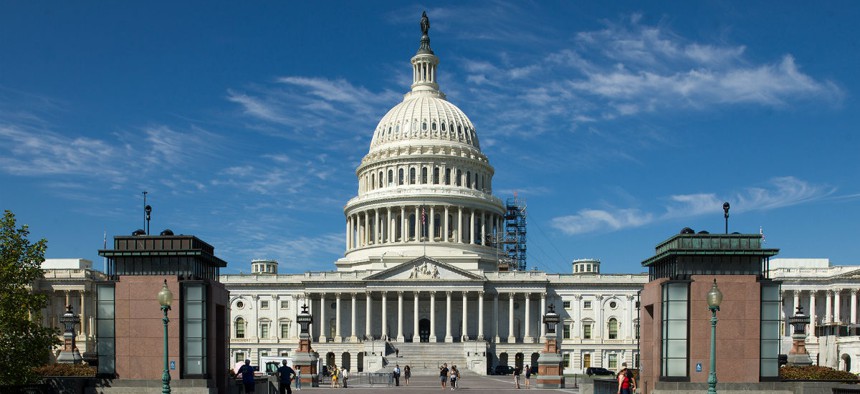
Architect of the U.S. Capitol
Now Available: 8,200 Reports Some in Congress Wanted to Stay Private
Transparency groups work out a deal with allied lawmakers to release Congressional Research Service reports.
Reports from the Congressional Research Service, long a proprietary tool controlled by lawmakers, are considered valuable enough by some to have generated a movement of researchers and transparency groups to make them freely available.
While legislation to make such a change has stalled, two unidentified lawmakers, one from each party, have arranged with the nonprofit Demand Progress—collaborating with the R Street Institute—to post a comprehensive batch on a new website. EveryCRSreport.com now offers 8,255 (and growing) downloadable current CRS reports on topics ranging from Navy ship names to agricultural food supports, sorted into 31 categories.
“The reports are not classified and do not contain individualized advice to any specific member of Congress,” Demand Progress explained, noting disagreements over what constitutes a full “report” versus a private memo that Congress’ think tank prepares for an individual member.
The website is intended to show Congress how, were it to pass legislation to free the reports, they could be offered. “We redact the phone number, email address, and names of virtually all the analysts from the reports,” the group wrote. “We add disclaimer language regarding copyright and the role CRS reports are intended to play.”
Older reports are available at another unofficial website, CRSreports.com, which offers RSS alerts and updates.
Asked for comment, Library of Congress Communications Director Gayle Osterberg noted to Government Executive that two lawmakers had made the reports available to the transparency groups from Congress’ internal system. “Reports are prepared by the Congressional Research Service for use by members of Congress,” she said. “It is up to members how they wish to use or distribute reports.”
The move to release taxpayer-funded research drew applause from the nonprofit Project on Government Oversight, a longtime advocate for the change whose blogger wrote of the new website, “As a resource, it is a great boon for journalists, students, and any taxpayer seeking insight on issues of public debate.”
Lawmakers who have pushed the legislation to open up the CRS reports include Sens. Patrick Leahy, D-Vt., and John McCain, R-Ariz., and Reps. Leonard Lance, R-N.J., and Mike Quigley, D-Ill.
Steven Aftergood, author of the widely read Secrecy News blog for the Federation of American Scientists who has made a cottage industry out of gaining access to CRS reports, had a mixed reaction. “It remains to be seen whether it will affect my work,” he told Government Executive. “If the new site is able to produce timely and reliable access to new CRS reports over an extended period, then I might redirect my efforts to other things.”
Aftergood noted that a majority of CRS reports in recent years have already been posted online. “I think the new website's practice of deleting the name and contact information of the CRS authors is a mistake,” he added. “The CRS analysts I know are proud of their work and have a professional interest in being credited for it. There is no reason to treat them as if they were under cover.”
Daniel Schuman, policy director of Demand Progress, said he has not heard complaints from CRS and he is not at liberty to identify the two lawmakers who made the project possible.
In a blog post describing his journey toward release of CRS’ work, he wrote, “CRS used to be a very different agency. It used to provide unvarnished advice for members of Congress on the crucial issues of the day. But over time, and especially during the 1990s, the mode of analysis changed to a description of issues, moving away from an evaluation of the strengths and weaknesses of various courses of action.”
But the reports remain invaluable to the public, particularly non-experts, Schuman wrote. And “public access to CRS reports is also good for CRS. It builds a public base of support for a legislative branch agency that far too often has suffered from the budget axe over the last two decades.”







